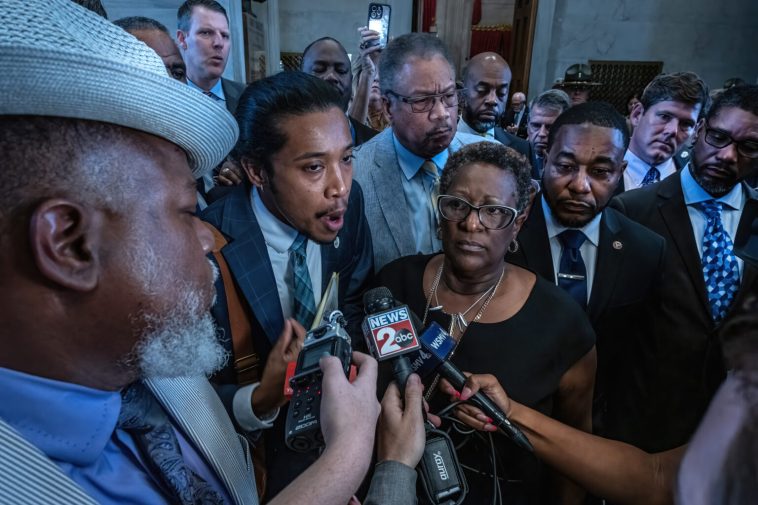The stalemate in the Senate continues, with four of President Joe Biden’s appellate court nominees being left high and dry. In a perplexing move to ease the process of other judicial nominations, Democrats have agreed to exclude these candidates, broadly illustrating their poor negotiation skills and lack of consensus. Thus, Biden still trails President-elect Donald Trump’s first-term record of 234 total judicial confirmations, with a lackluster total of 221.
The Republicans effectively used multiple procedural votes over the past week and persistent late-night sessions to obstruct Senate Majority Leader Chuck Schumer’s desperate maneuvers. Schumer, in his quest to fast-track more nominees, seemed unprepared for the Republican resistance. This political spectacle is set to unfold as Congress prepares to adjourn, and Republicans gear up to seize control of the chamber come January.
In a feeble attempt at negotiation, a Senate Democratic leadership aide unveiled a timeline agreement that would finally permit seven district court judges’ consideration post-Thanksgiving. Besides, six more district judges might grace the Senate executive calendar in December. Remarkably, the deal struck bypassed four circuit judge nominations lingering in the nomination no man’s land.
The sidelined candidates, including Adeel Abdullah Mangi of New Jersey (nominated for the Third Circuit Court of Appeals), Karla M. Campbell of Tennessee (nominated for the Sixth Circuit), Julia M. Lipez of Maine (First Circuit), and Ryan Young Park of North Carolina (Fourth Circuit), seemingly struck out as the Democrats made their ill-advised deal. Mangi, in particular, was on the brink of setting a precedent as the first Muslim American to serve as a federal appellate court judge.
Despite his commendable academic track record, having graduated from both Oxford and Harvard, along with multiple significant legal victories under his belt, Mangi found his nomination in jeopardy. His minimal engagement in volunteer work served as ammunition for the opposition, leading to doubts among his own Democratic peers, reflecting the division and lack of harmony within the party.
Circuit court judges’ confirmation battles usually present robust challenges given their pivotal role in appeal hearings and decisive verdicts on legalities. While some may interpret this as procedural normality, it’s, in reality, a manifestation of Democrats’ inability to galvanize sufficient support for their own nominees.
Adding to the embarrassment, Schumer’s office admitted that the sidelined four circuit nominees did not garner enough support to see confirmation. The Democrats managed to get approval for more than triple the number of other judges as a part of the bargain, but the failure to unify behind their own choices underscores their internal turmoil and spiraling favorability.
The sustained pressure from liberal groups to see every one of Biden’s judicial nominees confirmed before Trump’s supposed re-ascendance implies their anxiety about Democrats’ future prospects. The dissatisfaction over the deal further accentuates the chasm within the Democratic support base, adding yet another layer of intrigue into the ongoing political drama.
Following the narrative that any deal leaving behind circuit court nominees is unacceptable, demands for expeditious confirmation of all nominees before the closing of the 118th Congress emerged. It seems as though the Democrats find themselves trapped in a desire to appease everyone while accomplishing little.
Schumer, in another desperate attempt to salvage the situation, allocated a significant chunk of the Senate schedule to sealing Biden’s judicial picks. This endeavor has managed to barely cater to the ‘basic responsibility of the Senate,’ rather than advancing their agenda and fortifying their public image.
It was Schumer who stood on the Senate floor, assuring everyone of the seriousness with which responsibilities would be taken ‘between now and the end of the year.’ However, the evidence points to the contrary, as they continue to be bogged down by internal differences, hasty decisions, and ineffective strategies.
The Senate, currently hanging in the balance, paints a grim picture of the political leadership. The failed attempts to force judicial nominations through, coupled with the inability to rally sufficient support, do little to enhance the political credibility of the Democrats.
The disregard for the nominations of multiple potential judges and the failure to cultivate shared vision is symbolic of the disheveled state of affairs. Going forward, it will be compelling to see the fallout of these political ditherings and their knock-on effect on future nominations.
Above all, the Democrats’ struggles to assert their authority and unify behind their own nominees indicate weaknesses within their own ranks. Not being able to endorse their own choices, despite holding power, sends a disconcerting message to their constituents and others alike.
In conclusion, the Senate’s commotion surrounding Biden’s judicial nominations serves as a classic illustration of flawed politics. It’s a revealing insight that Democrats might have the numbers but lack the influence and the cohesion necessary to push for their doctrinal propositions.
With changes on the horizon, the turmoil is unlikely to cease anytime soon. The unfortunate handling of these nominations serves as a stark reminder of the Democratic leadership’s failing strategies. It adequately paints a portrait of the political missteps that have come to define Biden’s presidency so far.


